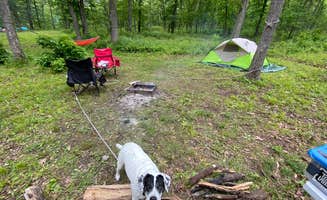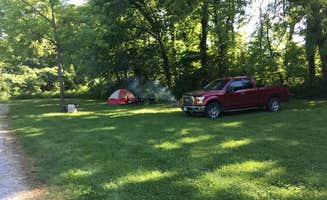Tent campsites near Sedalia, Missouri are distributed across conservation areas within a 60-mile radius of the city. The region features typical Midwestern terrain with elevations ranging from 700 to 900 feet and seasonal temperature variations that affect camping conditions throughout the year. Summer temperatures regularly exceed 90°F with high humidity, while spring and fall camping offers milder conditions but increased precipitation risk.
What to do
Fishing opportunities: Fiery Fork Conservation Area provides river access for various fishing styles. According to Amanda, "It's a great place to launch a boat from or just to wade in a bit and fish. Fly fishing can be done easily from the bank or by wading in a bit."
Wildlife viewing: The conservation areas harbor diverse wildlife populations. At Scrivner Road Conservation Area, campers can observe native Missouri species in their natural habitat. Josh S. describes it as having "an abundance of wildlife" with opportunities for equestrian trails and hiking.
Water recreation: Campers can cool off during hot months at several locations. Amanda notes that Fiery Fork has "quite a bit of 'beach' at the river access for them to play and see nature," making it ideal for families seeking water activities.
Seasonal hunting: During autumn, several conservation areas permit regulated hunting. Nick G. observed at Fiery Fork, "I stayed here for a few days in April. There were a few campers, but I'd be very surprised if this place isn't loud and packed in the summer." Another reviewer noted hunting activity during deer season.
What campers like
Privacy between sites: Many tent campsites near Sedona maintain good separation between camping areas. Shannon M. appreciated that at Fiery Fork there was "plenty of space between camp sites" creating a peaceful environment.
Natural features for hammock camping: Farrington City Park and other sites offer suitable trees for hammock setup. Whitney L. noted that Fiery Fork had "good hammock trees" along with "flat-level surface" for comfortable tent placement.
Well-maintained facilities: Despite the primitive nature of most sites, basic amenities receive regular attention. Mike G. found Farrington City Park "beautiful, well maintained" and noted that "the shower and bathroom facilities were basic, but more than adequate."
Budget-friendly options: Shannon M. pointed out that Fiery Fork is "a nice place if your on a budget and just need a get away," highlighting the free camping available at several conservation areas.
What you should know
Cell service limitations: Most conservation areas have minimal or no connectivity. Amanda reports at Fiery Fork, "We have AT&T for our cell service and there was absolutely NO service there which was good to get away, but bad in an emergency."
Seasonal flooding concerns: Water levels affect accessibility at several sites. Franklin Island camping can be particularly challenging according to Benjamin R. who found it "great quite and secluded" but warned it "can muddy due to sessional flooding."
Insect preparation: Beyond ticks, campers should prepare for various insects throughout warmer months. Chrischelle N. warned about one trail at Fiery Fork being "overgrown and HIGH tick contact probability."
Variable road conditions: Access to many sites requires driving on unpaved surfaces. Ry M. found the road to Fiery Fork "very sketchy" for their sedan, while others noted challenges for larger vehicles on gravel roads leading to remote sites.
Tips for camping with families
River access evaluation: Bledsoe Ferry and other riverside campgrounds offer water access, but conditions vary. Amanda suggests Fiery Fork for families because there is "quite a bit of 'beach' at the river access for them to play and see nature."
Wildlife viewing opportunities: Conservation areas provide educational experiences for children. Amanda reports, "We were able to see some wildlife while staying there as well. Armadillos, deer, and a few different bird types could be found easily."
Trash management planning: With limited disposal facilities, families must plan accordingly. Erick H. cautions, "There is no dumpster so be prepared to take your trash with you," which requires extra consideration when camping with children who generate more waste.
Tips from RVers
Size restrictions: Many conservation area access roads present challenges for larger vehicles. Chrischelle N. advises, "I recommend smaller RVs due to the 2 miles of gravel and high water areas you go through to get there" when referring to Fiery Fork Conservation Area.
Leveling considerations: Sites typically lack formal pads or leveling amenities. Whitney L. appreciated finding a "flat-level surface" at Fiery Fork, which is important for RV setup and stabilization.
Generator use awareness: With limited formal regulations at conservation areas, consider neighboring campers. One visitor noted seeing long-term campers running generators for extended periods during hunting season, suggesting generator use is tolerated but should be limited during quiet hours.



